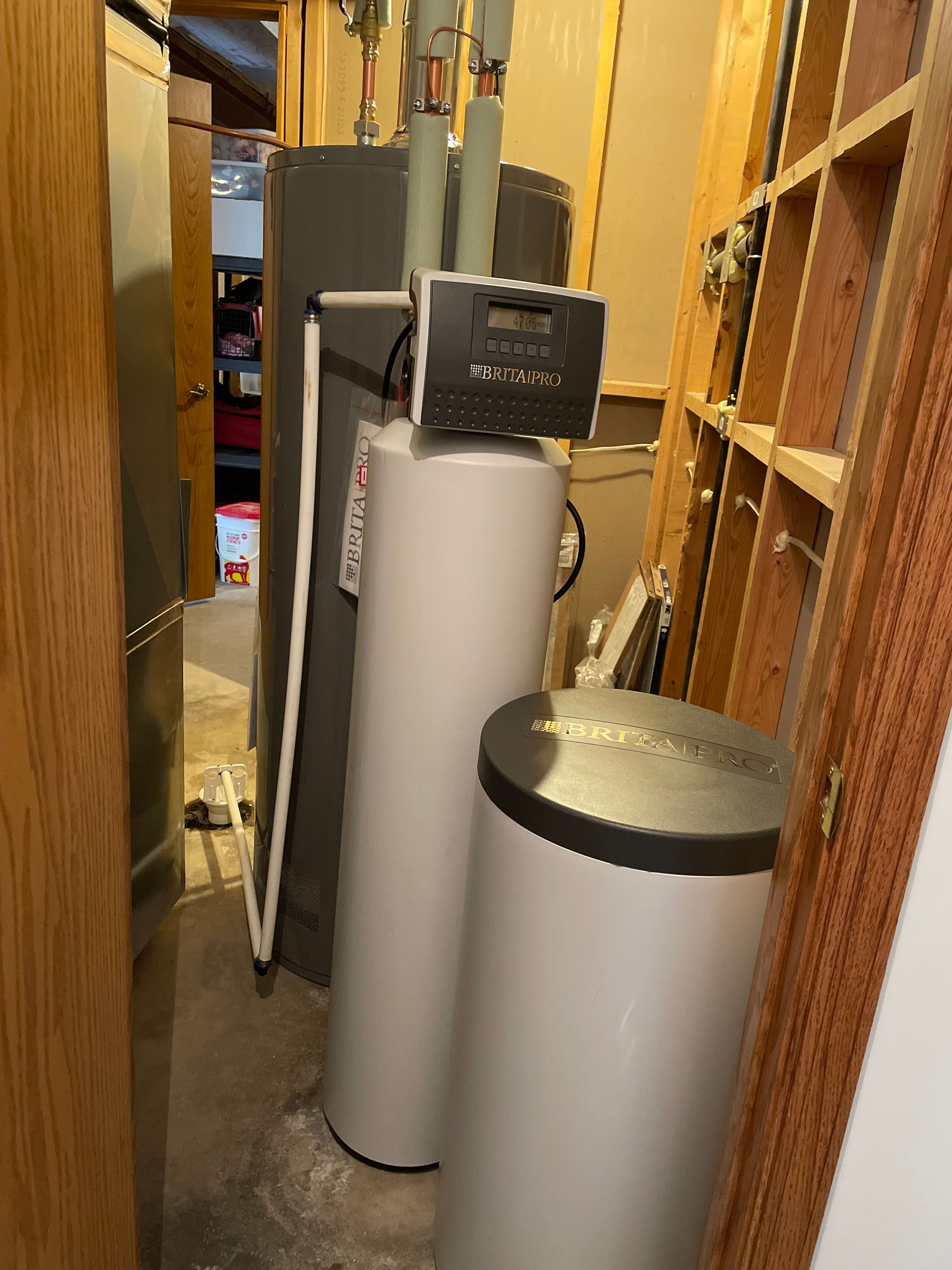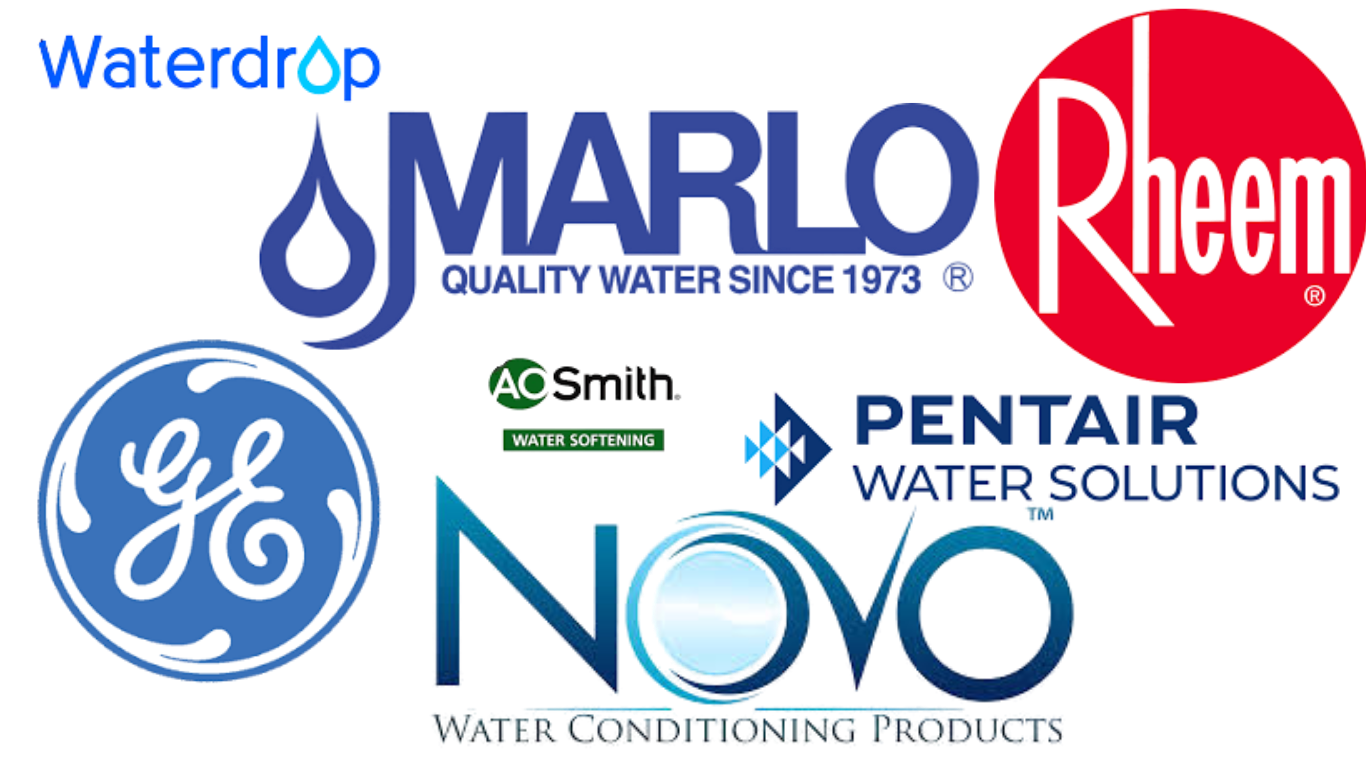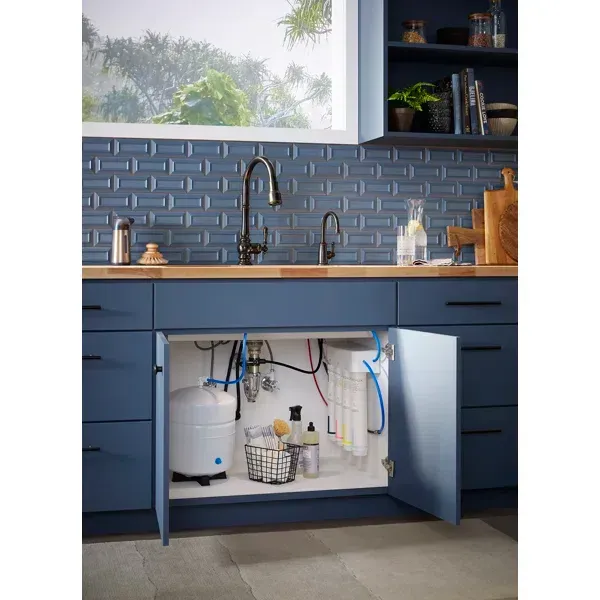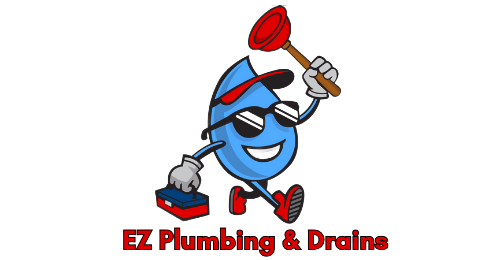
Water Softener
HOW TO CHOOSE THE RIGHT WATER SOFTENER FOR YOUR HOME
Choosing the right water softener is one of the best investments you can make for your home’s plumbing system, appliances, and water quality. Hard water is extremely common in Minnesota, and the right softener can prevent scale buildup, protect your fixtures, and improve the overall comfort of your home. Here’s what to consider when selecting the best water softener for your household.
How to Choose the Right Water Treatment System

1. Start With a Professional Water Test
A proper water test will tell you exactly how hard your water is and whether you have additional minerals like iron or manganese. Knowing your hardness level (measured in grains per gallon) ensures you choose a softener with the right capacity and features.
2. Understand the Type of Hardness You Need to Treat
Different homes deal with different types of hardness:
- Calcium & Magnesium: The main minerals that cause scale buildup.
- Iron: Requires a softener with specific media or an iron filter add-on.
- Sediment or Odors: May require pre-filtration to support the softener.
Matching the softener to the specific hardness issues ensures better performance and longer system life.
3. Choose the Correct Size & Capacity
Your household size and water usage directly impact the softener size you need:
- Small homes may need a 32,000-grain system
- Larger families often need 48,000-64,000 grain or higher
A properly sized system regenerates efficiently and lasts longer without being overworked.
4. Consider Your Budget and Long-Term Costs
When selecting a water softener, look at more than the sticker price. Consider:
- Up-front cost of the unit
- Installation cost
- Salt usage & efficiency
- Routine maintenance
High-quality systems often save money in the long run because they last longer and use less salt.
5. Installation and Maintenance Requirements
Most whole-house softeners require professional installation to ensure proper plumbing connections, bypass valves, and drainage. You’ll also want to consider:
- Ease of adding salt
- How often regeneration occurs
- Availability of replacement parts
- Warranty protection
Smooth installation and easy maintenance give you the best long-term value.
6. Invest in a Professional-Grade Water Softener
Not all softeners are built the same. Big-box store models may work temporarily but often fail early, use more salt, and provide inconsistent results.
Professional-grade softeners are engineered to last 3–4 times longer than many retail systems. They’re built with higher-quality valves, resin, and components—meaning better water quality, less maintenance, and greater long-term savings.
How to Choose the Right Reverse Osmosis (RO) System for Your Home
Reverse osmosis is one of the most effective ways to get purified, great-tasting drinking water straight from your tap. RO systems remove the widest range of contaminants, making them ideal for families who want the highest level of filtration. Here’s what to consider when choosing the right reverse osmosis system for your home:

1. Start With a Water Quality Test
Before choosing an RO system, it’s important to understand what’s actually in your water. A professional water test will identify levels of:
- Dissolved solids (TDS)
- Chlorine
- Fluoride
- PFAS
- Lead or heavy metals
- Minerals like calcium and magnesium
Knowing your water quality helps you pick the RO system with the right number of stages and filters.
2. Choose the Right Number of Filtration Stages
Not all RO systems are built the same. Common options include:
- 3-Stage RO: Basic filtration for improving taste and odor
- 4-Stage RO: Adds deeper contaminant removal
- 5–7 Stage RO: Premium systems that include remineralization, carbon polishing, and added filtration for maximum purity
More stages mean cleaner, safer, better-tasting drinking water.
3. Consider Storage Tank Size & Water Output
RO systems produce filtered water at different rates. When choosing a unit, look at:
- Tank capacity (how much clean water you can store)
- GPD rating (gallons per day the system can produce)
Larger families or homes with high cooking/drinking demand benefit from higher-output systems.
4. Look at Maintenance & Filter Replacement Costs
RO systems require routine filter changes to stay effective. When comparing systems, consider:
- How often filters need to be replaced
- How easy they are to access
- Cost of replacement filters
- Service requirements
Higher-quality systems offer longer-lasting filters and lower long-term costs.
5. Consider Installation Requirements
Reverse osmosis systems typically require:
- Professional installation
- A dedicated faucet
- A drain connection
- Space under the sink for the tank and filters
Professional installation ensures proper water pressure, leak-free connections, and maximum system performance.
6. Choose a High-Quality, Long-Lasting RO System
Premium RO systems use stronger membranes, better carbon filters, and more durable housings—meaning cleaner water and fewer repairs down the road. Investing in a high-quality unit ensures:
- Better-tasting drinking water
- Higher contaminant removal
- Longer membrane lifespan
- Lower maintenance costs
The result is safer, cleaner water for your family every single day.
What Is Reverse Osmosis?
At EZ Plumbing & Drains, we install and service high-quality Reverse Osmosis (RO) drinking water systems for homeowners throughout the Twin Cities. Reverse osmosis is one of the most effective ways to purify your drinking water. It uses a semipermeable membrane to remove dissolved solids, chemicals, bacteria, and other contaminants—giving you fresh, clean, great-tasting water straight from your tap.
RO systems typically use multiple stages of filtration, including:
- Sediment pre-filters to remove dirt and rust
- Carbon filters to eliminate chlorine and chemicals
- RO membrane that removes up to 99% of impurities
- Post-filters for final polishing and taste
The result is high-quality drinking water that removes harmful substances such as lead, arsenic, nitrates, PFAS, and more. Reverse osmosis is also a chemical-free, low-maintenance, long-lasting solution—making it one of the most popular options for families who want the purest water possible.
What Is Iron Filtration?
If your water has a metallic taste, orange staining, or leaves rust marks on sinks, tubs, or laundry, you’re likely dealing with iron in your water. At EZ Plumbing & Drains, we install professional-grade iron filtration systems that remove iron before it enters your plumbing system, helping protect fixtures, appliances, and water quality.
Iron filters work by using special media that traps iron particles as water flows through. There are two main types:
Oxidizing Iron Filters
These systems use oxygen or oxidizing agents to turn dissolved iron into solid particles that can be filtered out.
Catalytic Media Filters
These use a special media that triggers the conversion of iron into filterable particles without the need for chemicals.
Many iron filtration systems also remove:
- Manganese
- Hydrogen sulfide (rotten-egg smell)
- Sulfur
- Sediment
These systems are durable, low-maintenance, and provide cleaner, clearer, better-tasting water throughout your entire home.
Can I Install a Whole-House Sediment Filter Myself?
Technically, some homeowners try—but we strongly recommend professional installation.
A whole-house sediment filter protects your plumbing system from dirt, sand, rust, and debris. However, installing it incorrectly can lead to:
- Leaks
- Water pressure issues
- Damaged pipes
- Health and safety hazards
- Voided warranties
At EZ Plumbing & Drains, we size the filter correctly for your home, install the system on the main water supply line, and ensure proper connection, flow direction, and bypass setup. We also handle ongoing maintenance such as:
- Replacing cartridges
- Cleaning sediment buildup
- Checking pressure and flow
Professional installation ensures your filtration system performs the way it should—and protects your home long-term.
Why a Professional Plumber Is Best for Water Softener Installation
A water softener protects your plumbing system by removing minerals like calcium and magnesium that cause hard-water scale. These minerals shorten the lifespan of appliances, clog fixtures, reduce water pressure, and leave spots on dishes and shower doors.
Our licensed plumbers ensure your softener is:
- Correctly sized for your home
- Installed to code
- Connected with the proper bypass valves
- Plumbed to a safe drain
- Set up for efficient regeneration
We also help you choose high-quality professional-grade softeners—such as Diamond LinQ systems, which last 3–4 times longer than big-box store units.
Many manufacturers require professional installation to keep the warranty valid, so DIY installation can void coverage.
Does My Home Need Water Filtration?
If you're unsure about your water quality—or notice odors, discoloration, staining, buildup, or an unusual taste—your home may benefit from a water filtration system. Even if your water looks “fine,” it can still contain:
- Bacteria
- Lead
- Nitrates
- Chlorine/chloramines
- PFAS
- Sediment
- Iron or manganese
Filtration systems help protect your health, improve water taste, and extend the life of appliances and plumbing. If your home uses a private well, filtration is even more important since well water is not monitored by city water treatment.
The best first step is a professional water test so we can recommend the right system for your specific needs.
Is Reverse Osmosis the Best Water Treatment Option?
Reverse osmosis is one of the most powerful filtration methods available, removing up to 99% of contaminants. But whether it’s the best option for your home depends on your water quality and goals.
RO is ideal if you want:
- The purest drinking water
- Removal of dissolved solids, heavy metals, and chemicals
- Great taste and odor improvement
However, you may not need a full RO system if:
- Your main concern is chlorine (a carbon filter may be enough)
- Your home already has municipal treatment
- You only want whole-house filtration, not drinking-water purity
Reverse osmosis also produces wastewater during filtration and requires regular filter replacements.
Should you install it yourself?
We don’t recommend it. RO systems require:
- Proper pressure control
- Correct drain line installation
- Dedicated faucet installation
- Under-sink plumbing modifications
- Leak-proof fittings
A professional installation ensures long-term performance and protects your investment.
Testimonials
FROM OUR CUSTOMERS
Daniel was great to work with. He communicated promptly and gave us an early estimate. He got the work done quickly and his final bill was less than the estimate! Would highly recommend and will use him again.
Mary Lynn Waterhouse
The staff are very friendly and professional! They arrived when they said they would. The job turned out to be 10 minutes and they gave me a good price..
EZ Plumbing was great to work with! They installed a sump pump with a back up battery for me after a power outage almost caused a major basement flood. I requested quotes from other companies and they were the best priced option. Because my sump pump pit is not in a standard location, extra work arounds were needed for installation. Daniel and his team were as minimally invasive as possible and did a fantastic job. We are no longer at risk for basement flooding if the power goes out. Thank you!
frequently asked plumbing questions
How can I maintain my plumbing system?
Regular drain cleaning, avoiding harsh chemicals in drains, and scheduling annual inspections can help prevent problems and extend the lifespan of your plumbing system, for both residential and commercial properties.
What should I do if I discover a leak?
Shut off the water supply to the affected area and contact a licensed plumber immediately to prevent further damage, for both residential and commercial properties.
Title or Question
Describe the item or answer the question so that site visitors who are interested get more information. You can emphasize this text with bullets, italics or bold, and add links.
